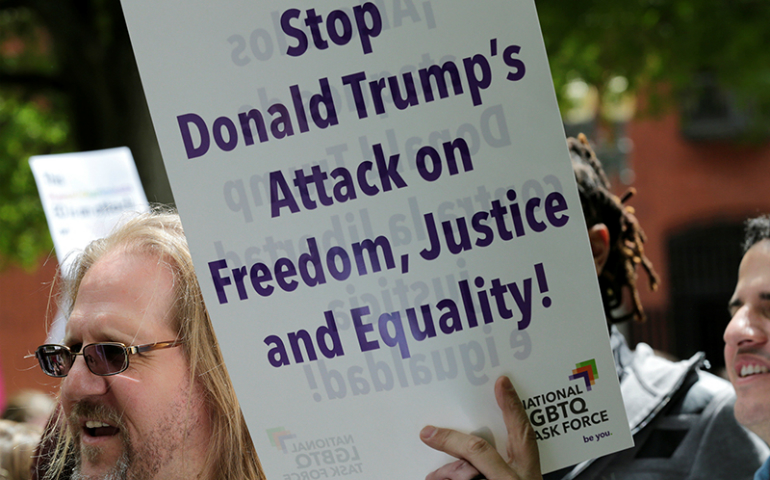
LGBT groups rally to oppose the religious freedom executive order that President Trump is expected to sign, outside the White House in Washington, D.C, on May 3, 2017. (Reuters/Yuri Gripas)
As President Trump readies a much-anticipated executive order on religious liberty, critics are lined up to take action before he even signs it.
Legal and religious experts say that the rights of women, LGBT people and religious minorities will be threatened by the new order but their fears are based on a draft of the order leaked earlier this year. Trump reportedly will sign an order as soon as May 4, which is the National Day of Prayer.
"If this executive order is anything like the one that was leaked in February, it would create an unprecedented license to discriminate with taxpayers' funds, undermine women's health care and elevate one narrow set of religious beliefs over all others," Sarah Warbelow, legal director of the Human Rights Campaign, an LGBT advocacy organization, told reporters on a Wednesday conference call.
After Politico reported Tuesday that the White House was gearing up for a signing this week, more than 1,300 faith leaders re-released a statement that urged Trump to refrain from signing an order or making policies with language similar to the draft.
"The religious freedom of individuals and organizations, including that of clergy and houses of worship, is already protected by the First Amendment and federal law," they said.
In February, The Nation reported on a leaked draft of a proposed order titled "Establishing a Government-Wide Initiative to Respect Religious Freedom" and wrote that on issues such as same-sex marriage, abortion, gender identity and premarital sex, the Trump administration would allow exemptions for people with religious objections that are so broad it would "legalize discrimination."
Protesters supporting LGBT and abortion rights gathered outside the White House at noontime Wednesday to encourage Trump not to sign the order.
At a February Capitol Hill hearing on religious liberty, Rabbi David Saperstein, the former U.S. ambassador for international religious freedom, said the leaked language could cause "constitutional problems."
Kim Colby, director of the Christian Legal Society's Center for Law and Religious Freedom, said after that hearing that an executive order can only go so far and some hypothetical examples cited by critics could not occur.
"An executive order can't change a law that Congress has passed," she said at the time.
Brigitte Amiri, a senior staff attorney with the American Civil Liberties Union, said Wednesday the leaked version of the order would allow religious organizations and employers that provide insurance under the Affordable Care Act to block access to contraception and other women's reproductive services if they have moral or religious objections.
"This is discrimination against women, plain and simple, and the use of religion should not be undertaken to discriminate against any individual, including women seeking contraception coverage," she told reporters.
She and Warbelow of HRC predicted that their organizations and others would be filing suits soon after the order is signed if it has language similar to the leaked document.
